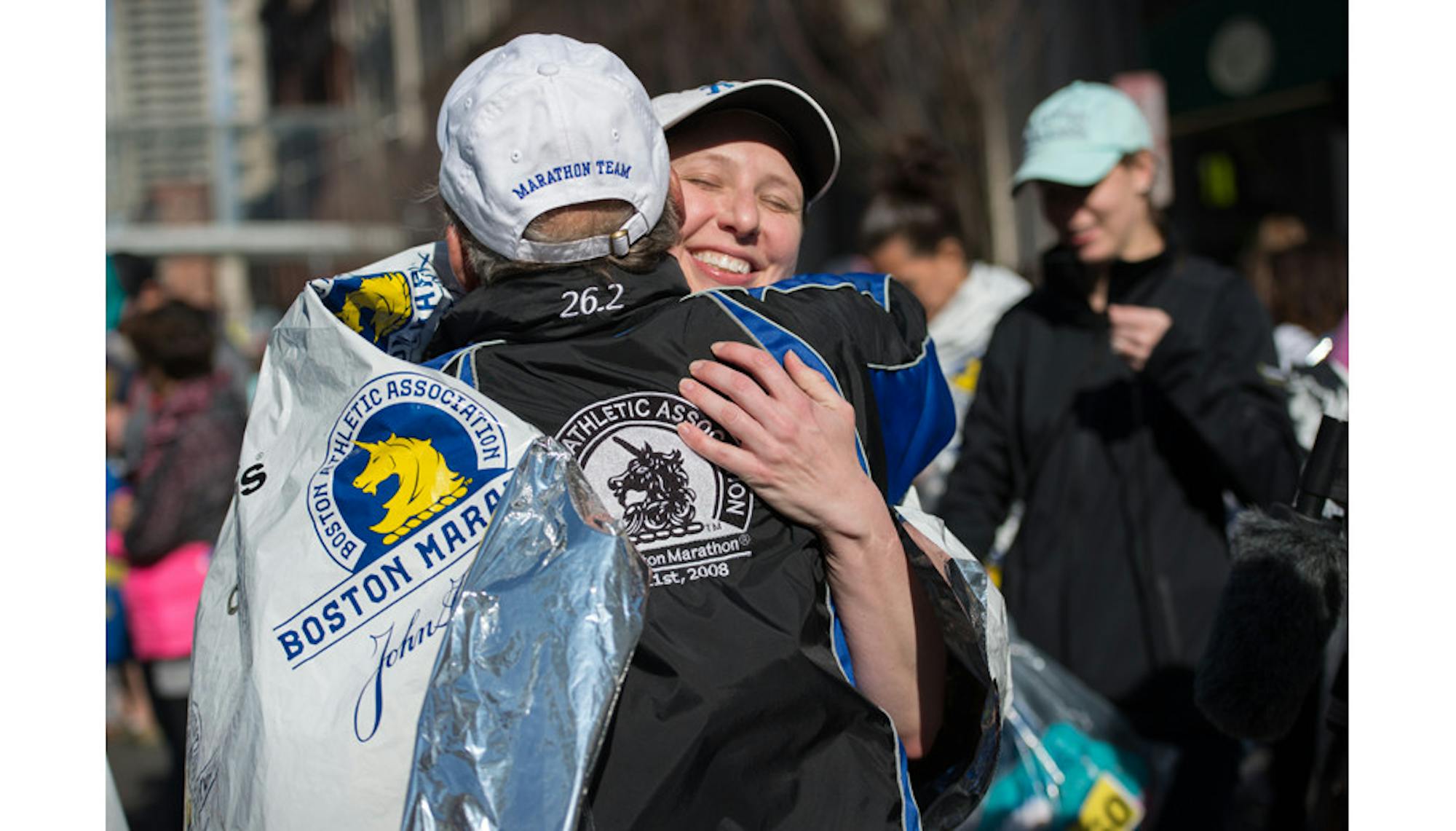25 members of the Tufts Marathon Team (TMT) participated yesterday in the 120th Boston Marathon, running in spots allotted by John Hancock Financial Services, the marathon’s principal sponsor.
The team ran to raise funds for the nutrition, medical and fitness programs at Tufts, including Friedman School of Nutrition Science and Policy research on childhood obesity, according to the TMT's fundraising site. At press time, the team had raised $91,505.
The Tufts team had raised over $470,000 during its 2015 marathon season, and has raised more than $5,028,309 since the team was created in 2003, according to the fundraising website.
Following the 2015 Boston Marathon, however, there was concern that the TMT would cease to exist after the expiration of the university's twelve-year agreement contract with John Hancock for runner bibs, according to TMT coach Don Megerle. He explained that prospects for a renewal of the contract looked grim in contrast to the team's flourishing membership of past years, with numbers reaching one hundred to two hundred runners.
Megerle explained that after last year’s Boston Marathon, Dariush Mozaffarian, Dean of Tufts' Friedman School of Nutrition and co-captain of the team Eric Johnson managed to negotiate a new five-year contract with John Hancock, in order to provide a smaller sum of bib numbers for the team.
Johnson, who serves as senior vice president for University Advancement, explained that the new contract guarantees an increasing number of running spots in the coming years, starting with 25 runners this year.
"Tufts and the Friedman School of Nutrition have just entered a new agreement with John Hancock that will allow our team to grow to 35 runners next year and 50 in 2018," he said, noting that the team will be capped at 50 runners for three years until the five-year contract expires, and that new terms may be up for negotiation.
According to Johnson, who is tasked with maintaining the team and advising the runners, these guaranteed numbers for the marathon team have important implications.
“Guaranteed entries allow runners who have not run a qualifying time to participate in the race if they agree to raise funds for charity,” he said.
Johnson explained that guaranteed bid numbers have some preliminary requirements.
“[I'm trying to ensure we] raise as much money as possible to make sure our team meets the overall fund raising requirement for retaining our guaranteed entries," he said. "While we ask our students to raise $1,500, we need to average significantly more than that to continue to qualify for the charity guaranteed entries. Most of the charities who receive entries for the Boston Marathon average $10,000 raised per runner."
Runners come from a large pool of interested applicants, from the group of people who train with the TMT to over three hundred people who do not run with the TMT but signed up in the bib lottery this past fall, Megerle explained.
Former University President Larry Bacow brokered the expired deal with the retired chairman of the board of John Hancock, David D’Alessandro, Megerle explained. A ten-year contract was created where Tufts would get two hundred bib numbers from the Boston Athletic Association to run in the Boston Marathon as a charity team, he said.
In order to be a charity team, the runners need to raise funds in return for the opportunity to run in the marathon. For the TMT, these funds are used to support research in the area of nutrition and the development of new educational programs, Johnson said.
However, after eight years the contract was altered to cover twelve years, with the last four years having only one hundred members a year rather than two years with two hundred numbers, Megerle said, leading to concerns about the team's chances of a contract renewal in the future.
“We were so used to having these large contingents of runners… With a hundred you can get a lot of alumni, you can get a lot of seniors, a lot of Fletcher kids, medical, dental, Friedman School, the Cumming School,” Megerle said.
Student team members have seen the effects of the negotiations in various ways.
TMT member Mauri Honickman explained that the team has not been tremendously impacted by the new contract.
"People have still found ways to run the Boston Marathon through other charities or run the Providence Marathon in a couple weeks from now," Honickman, a senior, said. "Coach Don [Megerle] said anyone else who doesn’t get [a bib] can run Providence and he’ll support them in the same way he does the Boston Marathon runners, so I haven’t noticed any difference."
Another TMT member, Eitan Scheinthal, also noted that the number of spots did not deter participation from first-years and sophomores.
“The number of spots that were allocated to the Tufts faculty, alumni, graduates and undergraduates were [lower]," Scheinthal, a senior said. "I don’t think that that’s necessarily a [deterrent]. We still have a large underclassman showing.”
TMT member Shoshana Weiner explained that while most of the changes have been negotiated behind the scenes, they are naturally ongoing as the university continues to negotiate its terms, and as the marathon itself experiences changes.
“Ever since my freshman year after the bombings the wall of total runners in the Boston Marathon has changed and evolved," Weiner, a senior, said. "It has gotten smaller...But it’s been continually changing each year based on the situation."
For photo coverage of the event please visit the Tufts Daily's photography blog Picture Tufts: http://picturetufts.tuftsdaily.com/2016/04/19/boston-marathon-2016/
Tufts Marathon Team runs in 120th Boston Marathon, operates under new contract

A Tufts Marathon Team runner Stacey Lancaster hugs Coach Donald Megerle after the finish of the 2016 Boston Marathon on April 18.





